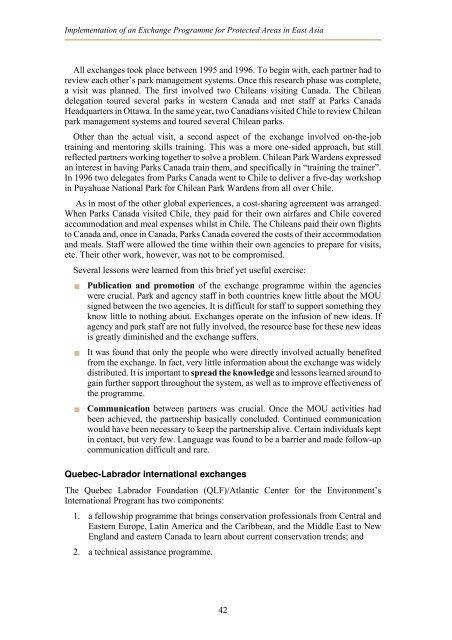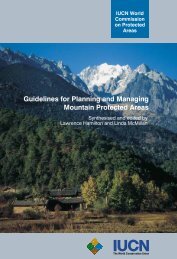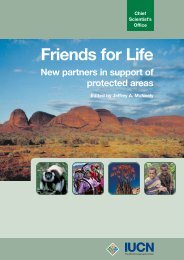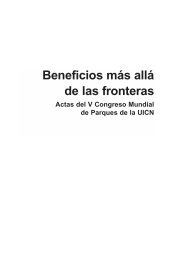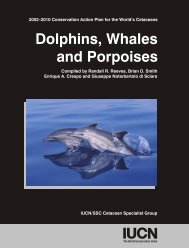Exchange programmes - IUCN
Exchange programmes - IUCN
Exchange programmes - IUCN
You also want an ePaper? Increase the reach of your titles
YUMPU automatically turns print PDFs into web optimized ePapers that Google loves.
Implementation of an <strong>Exchange</strong> Programme for Protected Areas in East Asia<br />
All exchanges took place between 1995 and 1996. To begin with, each partner had to<br />
review each other’s park management systems. Once this research phase was complete,<br />
a visit was planned. The first involved two Chileans visitingCanada. The Chilean<br />
delegation toured several parks in western Canada and met staff at Parks Canada<br />
Headquarters in Ottawa. In the same year, two Canadians visited Chile to review Chilean<br />
park management systems and toured several Chilean parks.<br />
Other than the actual visit, a second aspect of the exchange involved on-the-job<br />
trainingand mentoringskills training. This was a more one-sided approach, but still<br />
reflected partners workingtogether to solve a problem. Chilean Park Wardens expressed<br />
an interest in havingParks Canada train them, and specifically in “trainingthe trainer”.<br />
In 1996 two delegates from Parks Canada went to Chile to deliver a five-day workshop<br />
in Puyahuae National Park for Chilean Park Wardens from all over Chile.<br />
As in most of the other global experiences, a cost-sharing agreement was arranged.<br />
When Parks Canada visited Chile, they paid for their own airfares and Chile covered<br />
accommodation and meal expenses whilst in Chile. The Chileans paid their own flights<br />
to Canada and, once in Canada, Parks Canada covered the costs of their accommodation<br />
and meals. Staff were allowed the time within their own agencies to prepare for visits,<br />
etc. Their other work, however, was not to be compromised.<br />
Several lessons were learned from this brief yet useful exercise:<br />
� Publication and promotion of the exchange programme within the agencies<br />
were crucial. Park and agency staff in both countries knew little about the MOU<br />
signed between the two agencies. It is difficult for staff to support something they<br />
know little to nothingabout. <strong>Exchange</strong>s operate on the infusion of new ideas. If<br />
agency and park staff are not fully involved, the resource base for these new ideas<br />
is greatly diminished and the exchange suffers.<br />
� It was found that only the people who were directly involved actually benefited<br />
from the exchange. In fact, very little information about the exchange was widely<br />
distributed. It is important to spread the knowledge and lessons learned around to<br />
gain further support throughout the system, as well as to improve effectiveness of<br />
the programme.<br />
� Communication between partners was crucial. Once the MOU activities had<br />
been achieved, the partnership basically concluded. Continued communication<br />
would have been necessary to keep the partnership alive. Certain individuals kept<br />
in contact, but very few. Language was found to be a barrier and made follow-up<br />
communication difficult and rare.<br />
Quebec-Labrador international exchanges<br />
The Quebec Labrador Foundation (QLF)/Atlantic Center for the Environment’s<br />
International Program has two components:<br />
1. a fellowship programme that brings conservation professionals from Central and<br />
Eastern Europe, Latin America and the Caribbean, and the Middle East to New<br />
England and eastern Canada to learn about current conservation trends; and<br />
2. a technical assistance programme.<br />
42


